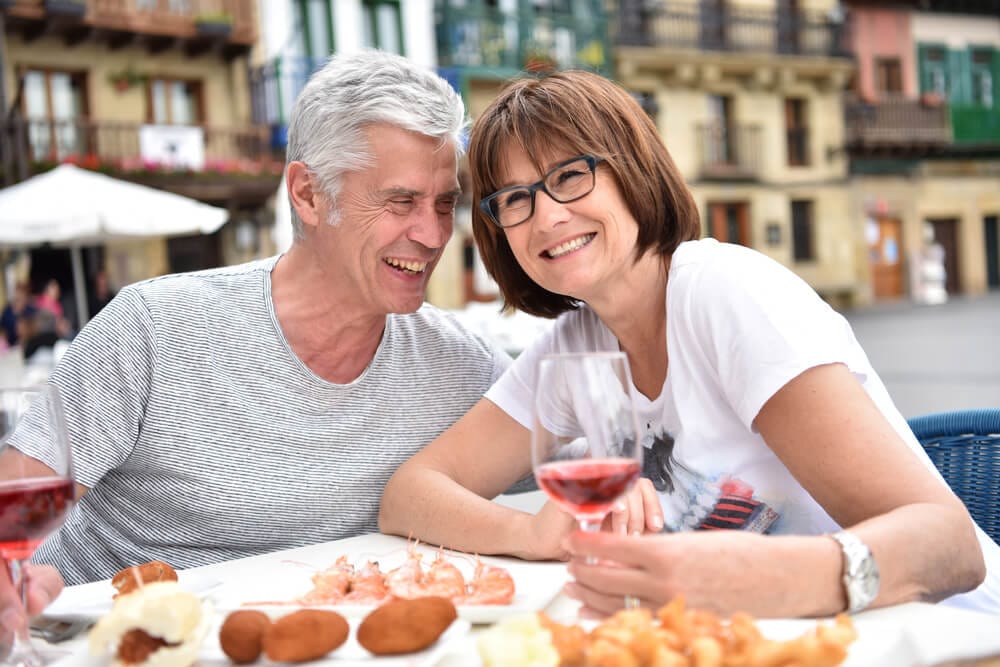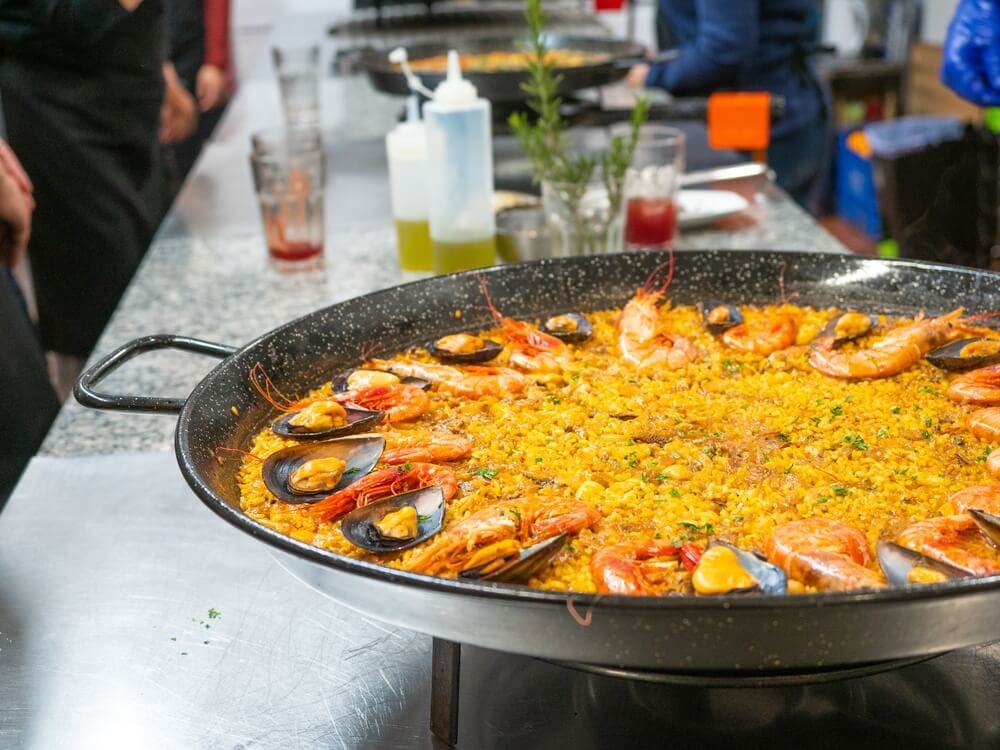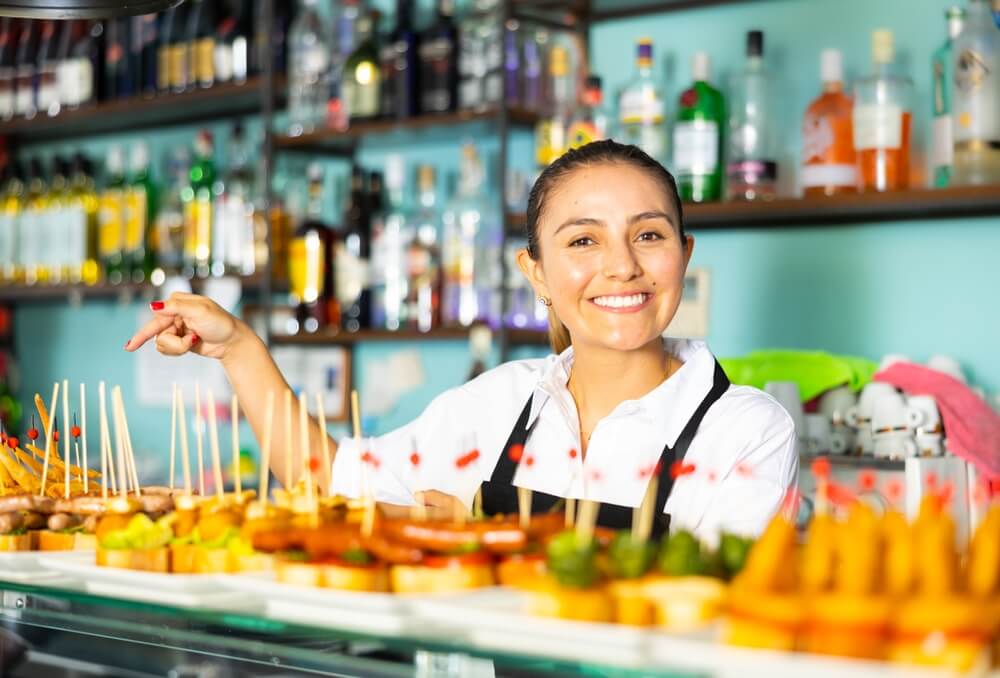
Tapas – Andalucía’s Most Beloved Culinary Tradition
Tradition and Evolution
Traditional Tapas
Andalusian tapas are a vibrant tapestry of flavors. Some iconic dishes include:
- Patatas Bravas: Crispy potatoes with spicy tomato sauce.
- Gambas al Ajillo: Succulent garlic shrimp.
- Jamón Ibérico: Cured Iberian ham, a delicacy.
- Olives: Marinated in various herbs and spices.
- Marinated Anchovies: Delicate and flavorful.
- Chilled Fino Sherry: A perfect accompaniment to these savory bites.
Evolution of Tapas
Over time, tapas have evolved from simple accompaniments to culinary masterpieces. Modern chefs are pioneering fusion tapas, blending traditional Spanish ingredients with global influences. This culinary innovation includes creative dishes like goat cheese-stuffed dates wrapped in bacon and mini paella bites, showcasing the limitless potential of tapas.
Spanish Culture and Social Rituals
Why Tapas Matter
Tapas symbolize generosity, hospitality, and the joy of sharing. They are more than just food; they are a social ritual that embodies the Spanish love for fostering community and connections. The tradition of “tapear” – going from bar to bar for tapas – is a lively and communal experience, reflecting the vibrant spirit of Spanish culture.
When to Enjoy Tapas
In Spain, the tapas clock ticks differently. Lunchtime (around 14:00) and late evenings (21:00 onwards) are prime tapas hours. Enjoying tapas is a leisurely affair, a chance to unwind, converse, and savor a variety of flavors.
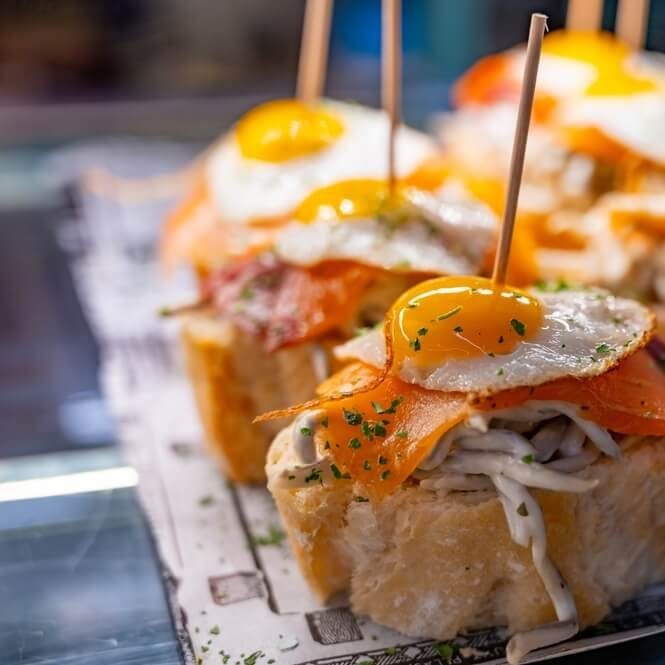
SIGN UP FOR OUR NEWSLETTER OR FOLLOW US ON SOCIAL MEDIA

Tapas Adventure Across Andalucía
Seville & Cordoba
Seville
In Seville, tapas are a true art form. Known for classics like Espinacas con Garbanzos (spinach with chickpeas) and Bacalao Frito (fried cod), Seville’s tapas bars are legendary. The city is home to some of the oldest tapas bars in Spain, dating back to the 17th century.
Córdoba
In Córdoba, tapas take on a unique twist with dishes like Salmorejo (a thicker version of gazpacho) and Flamenquín (ham and pork rolled and fried). The city’s patios, full of flowers, provide a stunning backdrop for your tapas adventure.
Granada & Cadiz
Granada
Granada is famous for its free tapas tradition! Order a drink, and you’ll get a delicious tapa on the house. Local favorites include Jamón Serrano and Pimientos de Padrón. This tradition started to keep workers from getting too drunk during their breaks
Cádiz
In Cádiz, tapas are influenced by its coastal location. Sample Tortillitas de Camarones (shrimp fritters) and Atún Encebollado (tuna with onions). The city’s carnival features special festive tapas – a true treat!
Malaga & Estepona
Málaga
Málaga’s tapas scene is all about fresh seafood. Try Boquerones Fritos (fried anchovies) and Gambas al Pil Pil (spicy prawns). Málaga is the birthplace of espeto, skewered sardines grilled over open flames.
Estepona
Estepona, with its rich Andalusian heritage, is a fantastic place to experience tapas. Traditional Estepona tapas include fresh seafood influenced by the Mediterranean, such as Boquerones al Limon (anchovies fried in a light lemon batter) offering a unique touch to the classic tapas experience.
Estepona's La Ruta de la Tapa
Tapas Heaven!
La Ruta de la Tapa (Tapas Route) is a highly anticipated event in the Estepona that takes place over a weekend in March or April every year and is part of the “Estepona Lives Its Streets” celebrations. It’s an opportunity to enjoy local food and culture while socializing with friends or meeting new people. In April 2024, the XIII Ruta de la Tapa had 27 establishments participating by offering different tapas and drinks at reduced prices.
Equally as important is the Best Tapa Contest, an integral part of this event, where said local bars and restaurants compete to create the best tapa based on customer choice. The winner receives a cash prize of €1,000 and recognition from the City Council. In 2024, The Avocado Restaurant claimed victory with their tapa, the “Saquito de rabo de toro con crema de jalapeño” (Oxtail pouch with jalapeño cream).
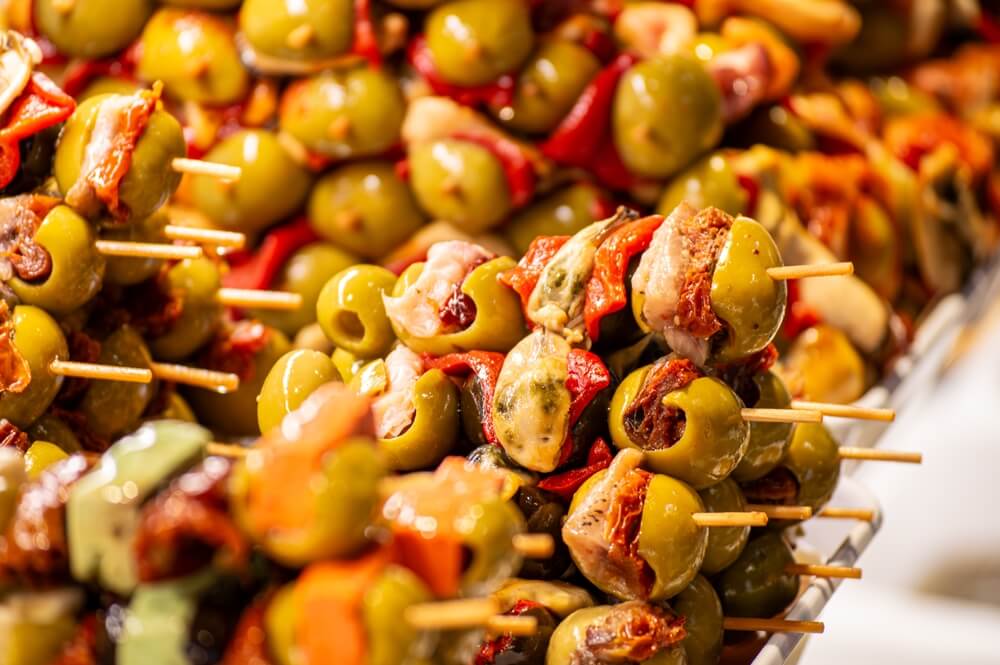
Interesting Fun Facts About Tapas
Tapas Day
Spain celebrates World Tapas Day every third Thursday of June, highlighting the cultural and culinary significance of these small dishes.
Culinary Innovation
In the Basque Country, tapas are known as “pintxos,” often skewered with a toothpick. They are famous for their artistic presentation and complex flavors.
Tapas and Raciones
Spanish restaurants often offer both tapas and raciones. While tapas are small bites, raciones are larger portions meant for sharing, perfect for when you want a bit more of your favorite dish.
Tapear – A New Verb
Spanish linguists even invented a verb for eating tapas: tapear. It captures the essence of going from bar to bar, enjoying small plates and drinks along the way.
Historic Ingredients
Before the 19th century, tapas were made from ingredients found in bodegas (wineries), albergues (inns), and posadas (hostels). These humble beginnings laid the foundation for the diverse and flavorful tapas we enjoy today.
Andalusian tapas have profoundly impacted Spain’s culinary history and culture. They reflect a tradition of community, innovation, and celebration. Whether you’re a local or a curious traveler, exploring the region’s tapas delights is an invitation to experience the heart and soul of Spain. So, next time you’re in Andalucía, indulge in the flavors, history, and culture that tapas have to offer. ¡Buen provecho!

